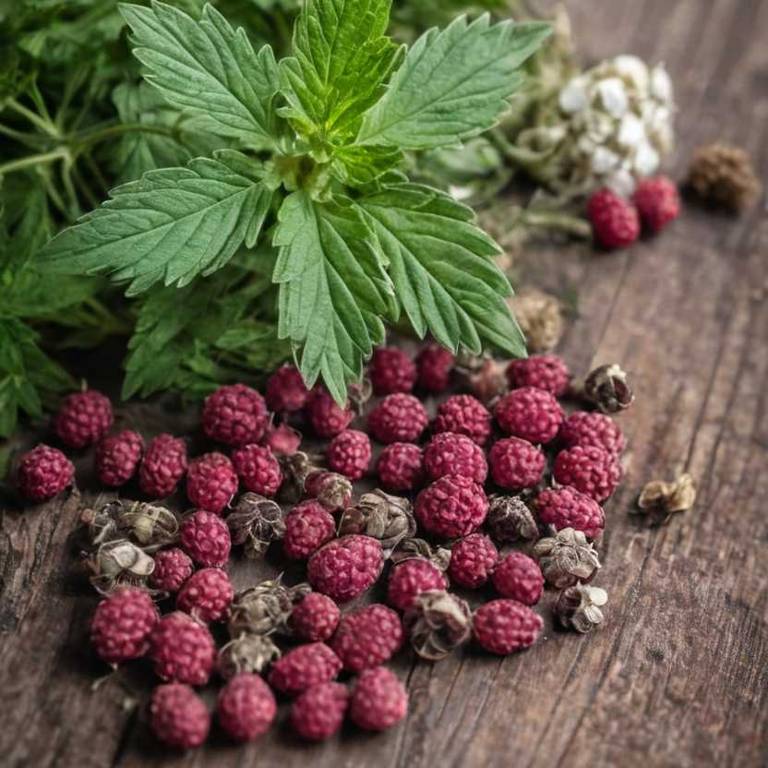By Leen Randell
Updated: Jul 06, 2024
What Are The Medicinal Properties Of Rubus Idaeus (Raspberry)?

Rubus idaeus, also known as raspberry, has health benefits such as antioxidant, anti-inflammatory, and antimicrobial properties.
The medicinal constituents of raspberry include anthocyanins, ellagic acid, and salicylic acid, which contribute to its therapeutic effects. Preparations of raspberry include teas, tinctures, and topical ointments, which are used to treat various ailments. Possible side effects of raspberry may include allergic reactions and digestive issues.
When using raspberry, it is essential to consult with a healthcare professional, especially for individuals with allergies or certain medical conditions.
This article explains the health benefits, active constituents, medicinal preparations, possible side effects, and precautions related to Rubus idaeus.
What are the health benefits of Rubus idaeus?
Rubus idaeus, also known as raspberry, has health benefits such as reducing inflammation and improving cardiovascular health due to its high antioxidant and fiber content.
The fruit's anthocyanins have been shown to have anti-inflammatory effects, while its vitamin C and potassium levels support immune function and blood pressure regulation.
Regular consumption of raspberries may also help to manage blood sugar levels and promote healthy digestion.
Here's a detailed article about the 10 health benefits of Rubus idaeus.
What are the active constituents of Rubus idaeus?
Rubus idaeus, also known as raspberry, has active constituents such as ellagic acid, anthocyanins, and phenolic acids, which exhibit potent antioxidant, anti-inflammatory, and antimicrobial properties.
Ellagic acid, in particular, has been shown to have antitumor activity, inhibiting the growth of various cancer cells.
The combination of these bioactive compounds contributes to the fruit's potential health benefits, including protection against cardiovascular disease, cognitive decline, and certain types of cancer.
Here's a detailed article about the 10 active constituents of Rubus idaeus.
What are the medicinal preparations of Rubus idaeus?
Rubus idaeus, also known as raspberry, has medicinal preparations such as jams, syrups, and extracts that have been used to treat various ailments.
The leaves, roots, and fruits of the plant are used to make remedies for digestive issues, high blood pressure, and inflammation.
Raspberry's antibacterial properties make it effective in treating infections, while its antioxidants have been linked to reducing the risk of certain cancers and cardiovascular diseases.
Here's a detailed article about the 10 medicinal preparations of Rubus idaeus.
What are the possible side effect of using Rubus idaeus improperly?
Improper use of Rubus idaeus, also known as raspberry, increases the chances of experiencing side effects such as diarrhea, stomach cramps, and nausea.
High doses can also lead to allergic reactions, skin irritation, and even kidney stones due to the presence of anthocyanins and oxalic acid.
Additionally, individuals with diabetes, blood pressure issues, or taking blood thinners should exercise caution when consuming raspberry due to its potential interactions.
Here's a detailed article about the 10 most common side effects of Rubus idaeus.
What precautions to take when using Rubus idaeus medicinally?
Before using Rubus idaeus, also known as raspberry, for medicinal purposes, you must take precautions such as consulting with a healthcare professional to determine the safe dosage and potential interactions with existing medications.
Also, pregnant or breastfeeding women should avoid using raspberry medicinally due to its emmenagogue properties, which may stimulate uterine contractions and affect fetal development.
Additionally, individuals with diabetes or bleeding disorders should exercise caution.
Here's a detailed article about 10 precautions to take when using Rubus idaeus.